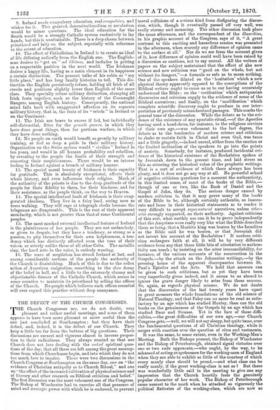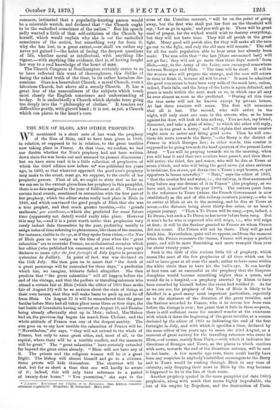THE DEFECT OF THE CHURCH CONGRESSES.
THE Church Congresses are, we do not doubt, very pleasant and rather useful meetings, and none of them appears to have been more pleasant or more useful than the one just concluded at Southampton ; but they have their defect, and, indeed, it is the defect of our Church. They keep a little too far from the bottom of big questions. Their discussions are earnest and vigorous almost in inverse propor- tion to their radicalness. They always remind us that our Church does not love dealing with the naked spiritual ques-: tions of the day, that all these are left among the great assump- tions from which Churchmen begin, and into which they do not too much love to inquire. There were two discussions in the Church Congress at Southampton on the same day, one on "the evidence of Christian antiquity as to Church Ritual," and one on " the effect of the increased cultivation of physical science and of literary and other research on Biblical criticism and belief." The first discussion was the most vehement one of the Congress. The Bishop of Winchester had to exercise all that presence of mind and strategic power with which he is endowed, to prevent moral collisions of a serious kind from disfiguring the discus- sion, which, though it eventually passed off very well, was really stormy and menacing. The other discussion took place the same afternoon, and the correspondent of the Guardian, in his graphic account of the Congress, says of it, "A great contrast to this exciting and hazardous session was presented in the afternoon, when scarcely any difference of opinion came to the surface at all." Nor do we see from the account given of it, how difference of opinion could well have been raised by a discussion so cautious, not to say unreal. All the writers of papers on the subject maintained that the effect of .the new science and new criticism was "good on the whole, but not without its dangers,"—a formula so safe as to mean nothing. One of the speakers dilated on the hesitation' which a new physical theory apparently opposed to the conceptions of the Biblical writers ought to cause us as to our having accurately understood the Bible ; on the verification' which antiquarian discoveries and criticism supply to the evidence of some of the Biblical narratives ; and finally, on the 'modification' which complete scientific discovery ought to produce in our inter- pretation of previously misunderstood passages. This marks the general tone of the discussion. While the debate as to the evi- dence of the existence of any apostolic ritual,—of the Apostles having used a head-dress, for instance, in the religious services of their own age,—was vehement to the last degree, the debate as to the tendencies of modern science and criticism to shake or sustain faith in Christ and even God, was tame and a little gingerly,—indeed unreal, either from the caution or the limited inclination of the speakers to go into the points of anxiety. Somebody, for instance, produced incidental evi- dence of the historical existence of the Rechabites spoken of by Jeremiah down to the present time, and laid stress on this as attesting the historical value of the prophetic writings. That is a sort of evidence of which there always has been plenty, and it does not go any way at all. No powerful school of negative criticism questions for a moment the authenticity, in this limited sense, of most of the books of the Bible,— though of one or two, like the Book of Daniel and the Gospel of John, they do. The serious danger caused by modern criticism is, that it may prove many of the books of the Bible to be, although certainly authentic, so inaccu- rate and loose in their historical statements as to render it very difficult to accept supernatural narratives, unless other- wise strongly supported, on their authority. Against criticism of this sort, what earthly use can it be to prove independently that the Assyrians were really very like what the Bible describes them as being, that a Moabite king was beaten by the Israelites as the Bible said he was beaten, or that Jeremiah did not invent his account of the Rechabites ? If modern criti- cism endangers faith at all, it will be by very different evidence from any that these little bits of attestation to authen- ticity can touch ; by insisting on the utter irreconcilability, for instance, of the various accounts of the resurrection in the Gospels,—by the attack on the Johannine writings,—by the pressing home of the apparent discrepancies between St. Paul's Epistles and the Acts. We hold that answers can be given to such criticisms, but as yet they have been very imperfectly given indeed, and it seems to us absurd to ignore the grave danger likely to arise from these sources. So, again, as regards physical science. We do not doubt that the discoveries of the lass twenty years have upset in great measure the whole foundations of the old science of Natural Theology, and that Paley can no more be read as satis- factory by an age which has studied Huxley, than can the old books on the genuineness of the Gospels by an age which has studied Baur and Strauss. Yet in the face of these diffi- culties,—the great difficulties of our own age,—our Church Congress gets,—well, we will not say sleepy, but quite tame, over the fundamental questions of all Christian theology, while it surges with emotion over the question of rites and vestments.
It was the same, to some extent, even in the Working-Men's Meeting. Both the Bishops present, the Bishop of Winchester and the Bishop of Peterborough, obtained signal victories over one or two rude opponents,—who ought, by the way, to be ashamed of acting as spokesmen for the working-men of England when they are able to exhibit so little of the courtesy of which every manly class should be proud,—and what class can be really manly, if the great working-class is not so ? But there was wonderfully little said in the meeting to give one any impression that the Church heartily feels the genuinely popular character of her work. The Bishop of Peterborough came nearest to the mark when he attacked so vigorously the political flatteries of the working-class, which are now so
common, intimated that a popularity-hunting parson would be a miserable wretch, and declared that "the Church ought to be the embodied conscience of the nation." But his speech sadly wanted a little of that self-criticism of the Church by herself, which would explain why she is not the embodied conscience of the nation, but something very far from it, why she has lost, to a great extent,—or shall we rather say never yet gained f—the habit of facing the deepest questions of life, whether moral or intellectual, with anything like vigour,—with anything like evidence, that is, of having fought her way to a real knowledge of the heart of man.
The Church Congress at Southampton certainly seems to us to have reflected this want of thoroughness, this dislike of facing the naked truth of the time, in its rather harmless dis- cussions. Ours is a benevolent Church, a moral Church, even a laborious Church, but above all a seemly Church. It has a great fear of the unseemliness of the subjects which touch most closely the English conscience and understanding of to-day. It is undoubtedly a Church which shrinks from going too deeply into the "philosophy of clothes." It touches our difficulties gently, with gloved hand ; it is not, as yet, a Church which can pierce to the heart's core.































 Previous page
Previous page